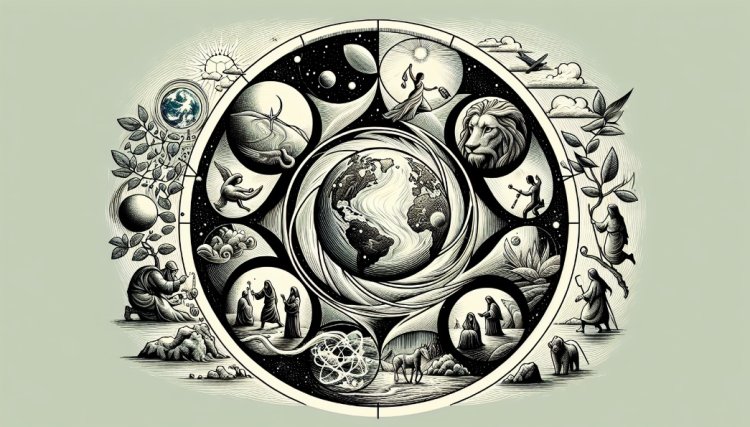The Age of the Earth: Evidence for a Literal Six-Day Creation
Dive into Kent Hovind's controversial perspective on the age of the Earth, exploring his interpretation of biblical evidence and scientific arguments. Understand the debate surrounding young Earth creationism, engage in critical thinking, and delve into the complexities of faith and science.

Introduction
Have you ever wondered why we exist and how old the Earth is? People have been discussing these important problems for a very long time. In this blog, we will talk about Dr. Kent Hovind's beliefs and his seminar about how old the Earth is. Dr. Hovind shares evidence that indicates the Earth is not billions of years old. Instead, he believes it was created in six actual days, just like it says in the Book of Genesis. Let's talk about why it's important to discuss the theory of evolution and the three main objectives of this seminar.
The Purpose of Life and the Age of the Earth
As people, we often wonder why we are here and where we come from. Many people have tried to answer big questions about life and the world, like how old the Earth is. Dr. Hovind's seminar tries to give strong proof that questions the idea of the Earth being a billion years old and supports the belief that it was created in just six days. He looks at scientific evidence and shares a different way of thinking about the commonly believed theories.
Introduction to Dr. Kent Hovind and His Beliefs
Dr. Kent Hovind is a speaker who talks about creation, evolution, and dinosaurs. He used to be a science teacher in high school. He strongly believes that the Bible is perfect and thinks that it is a message from God. Dr. Hovind wants to teach others about his knowledge and evidence by giving seminars, like the one about how old the Earth is. He believes that the Bible is the most reliable source of truth.
The Importance of Answering the Evolution Theory
Dr. Hovind emphasizes the significance of addressing the evolution theory. He argues that evolution is not based on scientific evidence and should not be regarded as a valid scientific theory. Instead, he asserts that it is a religious belief that has infiltrated various aspects of society, including education and the legal system. By debunking the evolution theory, Dr. Hovind aims to challenge the dominance of this philosophy and encourage critical thinking and exploration of other perspectives.
The Three Goals of the Seminar
Dr. Hovind is in charge of the seminar, which has three main goals. First, he wants to make people's faith in the word of God stronger and encourage them to believe in a literal understanding of the Bible. Next, he wants to provide proof and reasons to those who haven't been saved yet, to help them think about accepting Jesus Christ as their savior. Lastly, Dr. Hovind wants to encourage those who are already saved but not currently serving the Lord to start taking action and live a life devoted to serving God.
Dr. Hovind's background and beliefs
Dr. Kent Hovind is a teacher who speaks on creation, evolution, and dinosaurs. He was a former high school science teacher. Dr. Hovind has been a science teacher for 15 years, so he knows a lot about the topics he talks about. You can see how much he enjoys sharing his knowledge in his seminars, such as the one on how old the earth is.
Dr. Hovind firmly believes that the Bible is perfect and cannot be wrong. He believes it is a message from God. He believes that the Bible is the most important and reliable source of truth. He believes that the earth was created in exactly six days, just as it is written in the book of Genesis. Dr. Hovind's viewpoint is different from the generally accepted theories he has established based on his research and study of scientific evidence.
Dr. Hovind believes that it is very important to understand the teachings of the Bible. He believes that the Bible provides answers to life's most important questions, such as why we are here and where we come from. He wants to understand the big questions of life by studying the Bible and explaining them to others.
Dr. Hovind believes that Christians have an important role to play in addressing the theory of evolution. He believes that the theory of evolution does not have enough scientific evidence and should not be considered a valid scientific theory. Instead, he believes it is a religious belief that has spread into various areas of society, such as education and the legal system. Dr. Hovind wants to challenge the notion that evolution is always correct. He does this by showing that some of its ideas are not true. He also wants people to think for themselves and consider other points of view.
Worldviews and the Four Great Questions of Life
Understanding different worldviews is crucial when exploring the four great questions of life: Who am I? Where did I come from? Why am I here? And where am I going when I die? Humans have been pondering these issues for centuries, and our worldview is firmly rooted in them.
The Two Conflicting Worldviews: Humanism and Creationism
When it comes to worldviews, two conflicting perspectives stand out: humanism and creationism. Humanism is a worldview that believes in the power of human reason and agency, emphasizing the importance of science and secular values. On the other hand, creationism is a worldview rooted in religious beliefs, particularly in the infallibility of the Bible and the idea that God created the Earth in a literal six-day creation.
The Importance of Answering the Four Great Questions of Life
Addressing the four great questions of life is crucial for individuals seeking purpose and understanding in their lives. These questions delve into the core of our existence and provide guidance on how to live a meaningful life. Without answers to these questions, individuals may feel lost or disconnected from their purpose.
The Impact of Worldview on the Answers to These Questions
Worldview plays a significant role in shaping the answers to the four great questions of life. The belief in humanism leads to answers that are centered around human reason and agency, emphasizing individualism and self-fulfillment the other hand, the belief in creationism leads to answers rooted in religious beliefs, emphasising the importance of living under God's purpose.
The Origins of Evolution
People have been talking and arguing about the idea of evolution for a long time. This idea comes from Charles Darwin, who wrote about natural selection in his book "On the Origin of Species." Darwin's theory says that species change over time through natural selection. This means that individuals with helpful traits are more likely to live and have babies.
But we cannot ignore the fact that there are doubts about God's word and the role of Satan in influencing these doubts. Some religious people think that the theory of evolution goes against their beliefs and question the idea that humans were made to be like God. They believe that the idea of evolution is a trick by Satan to make people lose their faith in religion and want to be like God.
Many people have religious beliefs about evolution. Certain Christian groups, such as the Catholic Church, have embraced the theory of evolution without losing their belief in God. They think that God made the world by using natural processes like evolution to create different kinds of living things.
Some other religious groups, such as certain branches of Islam and Judaism, also have their own understandings of evolution that bring together their beliefs with scientific theories. Instead of disagreeing with their religious beliefs, they see evolution as a natural process that God made.
The origins of the theory of evolution and the beliefs connected to it are complicated and closely connected to religious beliefs. Some people think that evolution goes against their beliefs, but others find ways to include it in their religious beliefs. People are still talking and thinking about how evolution affects religious beliefs.
The Big Bang Theory
Understanding the Big Bang theory is essential when exploring the origins of the universe. According to this theory, around 13.8 billion years ago, all matter in the universe was concentrated in a small, dense region no larger than a period on a page. This incredibly tiny dot, often referred to as a singularity, was incredibly hot and eventually exploded, resulting in the creation of the universe as we know it today.
The Flaws and Contradictions of the Big Bang Theory
While the Big Bang theory is widely accepted by the scientific community, it is not without its flaws and contradictions. One of the main issues is the question of what caused the singularity to explode in the first place. The theory does not provide a clear answer to this fundamental question, leaving room for speculation and alternative theories.
The Problems with Matter and Energy Creation
Another problem with the Big Bang theory is the issue of matter and energy creation. The theory suggests that all matter and energy in the universe came from this initial singularity. However, the concept of matter and energy coming into existence from nothing contradicts the first law of thermodynamics, which states that matter and energy cannot be created or destroyed.
The Issue of Adding Energy and Overcoming the Second Law of Thermodynamics
Furthermore, the Big Bang theory raises questions about the second law of thermodynamics, which states that the entropy, or disorder, of a closed system tends to increase over time. The universe is considered a closed system, so the idea of adding energy and overcoming the second law of thermodynamics presents a challenge to the theory.
While the Big Bang theory has provided a framework for understanding the origins of the universe, it is important to recognize its limitations and the ongoing scientific discussions surrounding it. Scientists continue to explore alternative theories and seek a deeper understanding of the mysteries of the universe.
Teaching Evolution in Schools
The teaching of evolution in schools has been a controversial topic for many years. While some believe it is important to include the theory of evolution in the curriculum, others argue that it contradicts their religious beliefs and should not be taught in public schools.
The Controversy Surrounding Teaching Creation in Public Schools
One of the main controversies surrounding the teaching of evolution in schools is the conflict it presents with the belief in creationism. Many religious individuals believe that the theory of evolution undermines the teachings of their faith and challenges the notion of humans being created in the image of God. They argue that creationism should be taught alongside, or instead of, evolution in public schools.
The Influence of Evolution on Society and Behaviour
Proponents of teaching evolution in schools argue that students must understand the scientific basis of life on Earth. They believe that learning about evolution helps students develop critical thinking skills and understand the natural world. Additionally, understanding evolution can help students make informed decisions about topics such as genetic engineering and the conservation of biodiversity.
The Importance of Teaching Absolutes and Moral Values
Some argue that teaching evolution without including discussions on moral values and absolutes can lead to a lack of moral grounding. They believe that teaching absolutes and moral values is essential for students to develop a strong ethical foundation. This can be achieved by incorporating discussions on ethics and moral values into the curriculum alongside the teaching of evolution.
The Impact of Evolution on Society
The teaching of evolution has had significant consequences for society. Let's explore some of these impacts:
The Consequences of Teaching Evolution
Teaching evolution in schools has led to a shift in societal beliefs and values. It challenges traditional religious beliefs and has caused a divide between those who believe in creationism and those who support the theory of evolution. This divide has resulted in conflicts and debates within society.
The Rise in Premarital Sex and Sexually Transmitted Diseases
Some argue that the teaching of evolution has contributed to a rise in premarital sex and the spread of sexually transmitted diseases. The theory of evolution suggests that humans are simply a product of natural selection and the survival of the fittest. This belief can lead to moral relativism, where individuals feel justified in engaging in casual sexual relationships without consequences.
The increase in unwed births and abortions
There is a correlation between the teaching of evolution and an increase in unwed births and abortions. The belief that humans are just another species and that life has no inherent value can lead to a devaluation of human life. This can result in a higher acceptance of unwed pregnancies and the choice to terminate pregnancies through abortion.
Lessons from the Story of Timothy
The story of Timothy in the Bible provides a cautionary tale about the impact of evolutionary beliefs on society. In Timothy, we learn about a man who strayed from his faith and the consequences he faced as a result. This story serves as a reminder of the importance of staying rooted in one's beliefs and resisting the pressures of society.



 admin
admin 










